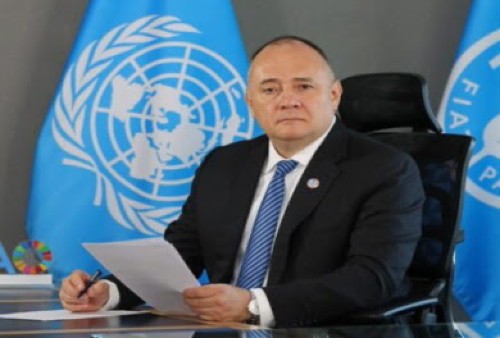FAO Says Success of COP30 is Important to Food and Global Stability
BRIDGETOWN, Barbados – The assistant director-general of the Food and Agriculture Organization (FAO), René Orellana Halkyer, says the future of food, sustainability, and global stability depends on the ongoing 30th meeting of the Conference of the Parties (COP30)in Brazil being more than a summit.
 René Orellana HalkyerHalkye, who is the FAO regional representative for Latin America and the Caribbean, said the event must be the beginning of a new era of climate action centered on agrifood systems.
René Orellana HalkyerHalkye, who is the FAO regional representative for Latin America and the Caribbean, said the event must be the beginning of a new era of climate action centered on agrifood systems.
The recently appointed FAO senior official said that climate change is no longer a future threat, but a reality that is reshaping agrifood systems and compromising global food security. He said it impacts are evident in both the quantity and quality of food, affecting agricultural yields, water availability, pest emergence, disease spread, and fundamental processes such as pollination. Even changes in atmospheric CO₂ concentration are altering crop biomass and nutritional value.
Halkye recalled that in 2024, climate shocks were the main driver of food crises in 18 countries, affecting 72 million people experiencing high levels of food insecurity. Hurricane Melissa, which struck Jamaica, Haiti, and Cuba, is a recent example of the severe effects these events have on agrifood systems.
Over the past five decades, climate change has reduced global cereal yields by two to five per cent Latin America alone, maize yields have declined by around five percent and since 1961, climate change has reduced global agricultural productivity by 21 per cent, which is equivalent to losing seven years of progress.
Halkye said these figures make one conclusion clear and that it is urgent to rethink and transform agrifood systems by accelerating mitigation and adaptation measures. But doing so requires addressing a critical financing gap.
“Despite the urgency, in 2023 only four per cent of climate-related development financing was allocated to agriculture, livestock, fisheries, and forestry. This imbalance threatens the ability of the most vulnerable countries to adapt and transition toward sustainable production models.
“If we truly want agrifood systems that are more sustainable and resilient, climate financing must prioritize agriculture and the livelihoods of rural communities. Without sufficient resources, international commitments will remain words on paper rather than concrete results.”
Halkye said that in this context, COP30 is decisive, adding that the promotion of agroforestry projects in the Amazon, which restore degraded lands and directly benefit local communities, is a fundamental element for the sustainability of ecosystems related to food and agriculture.
He said the presentation of the Tropical Forests Forever Fund (TFFF), led by Brazil with support from the World Bank, proposes an innovative model to finance global forest conservation, seeking to mobilize USD 25 billion from countries and US$100 billion from private investors.
“This approach shows that sustainability can also be an economic opportunity when there are vision and commitment,” Halkye said, adding that the early approval of the COP30 agenda demonstrates political will to advance on climate financing, energy transition, adaptation, and resilience.
“The challenge now is to turn commitments into concrete targets, with clear deadlines and real resources. History has shown that promises without action do not feed anyone.
“At FAO, we are promoting strategies that combine mitigation and adaptation, such as integrated fire management, whose Call to Action was launched at this COP under the leadership of Brazil and with the support of 50 countries.
”COP30 arrives at a crucial moment to place agriculture, food, and the role of Indigenous Peoples and rural communities at the center of global discussions. The future of food, sustainability, and global stability depends on COP30 being more than a Summit: it must be the beginning of a new era of climate action centered on agrifood systems,” he added.


